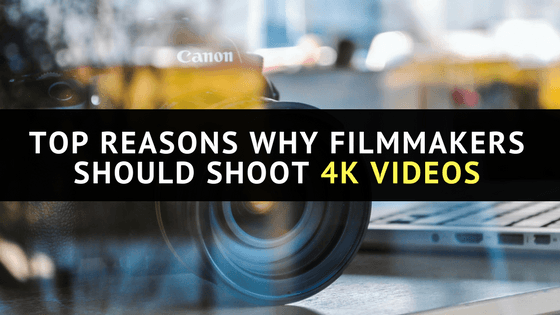4K has become increasingly popular since the arrival of affordable 4K resolution consumer cameras. The more pixels you have, the clearer and crisper your picture will be. This is the mindset of most filmmakers, but still, not all filmmakers are sold on the technology. One of the reasons is because not all TVs and computers can read 4K. However, 4K can certainly be exported into a great, high-quality 1080p video and provides more benefits than you could possibly imagine. Given the correct camera usage and high-grade computers with a lot of space and support for 4K technology, you’re on your way to producing professional cinematic films that meet international standards.
4K footage is 4000 pixels wide and taken with cameras like the Panasonic GH4 and Epic Red. It generates a sharper output compared to 1080p resolution. 4K videos are used by filmmakers for several reasons:
4K Provides a Clean, Stabilized Video.
While many filmmakers use a camera stabilizer to reduce camera shake and smooth camera motion, the effect is not always perfect. This is why filmmakers apply image stabilization effects using video editing software like Adobe Premiere or Final Cut Pro. However, post-stabilization will re-scale your clips and reduce the resolution, making your film less sharp than the original 1080p or 720p footage. Shooting at 4K helps avoid this problem because there are more pixels to work with, leaving your video just as sharp as you originally shot it.

4K Leaves Crisp Images After Cropping.
The extra pixels you get from 4K are a huge benefit when you need to crop a scene. Whether you need to zoom in on a subject or tilt or pan a scene for effects, 4K will leave you enough room to reduce the shot while keeping all of the details intact. In fact, you can crop up to 4 times in the same shot while still maintaining up to 1080p resolution.
4K is Great for Backing Up Your Film.
Playing your film on the big screen or at film festivals require huge formats like Digital Cinema Package or Blu-ray which requires higher resolutions. 4K may not be playable on all devices, but it can certainly be exported into more workable formats while maintaining a clear and sharp resolution compared to exporting a 1080p film. It takes some time to export though, so make sure to have extra patience and ensure your PC or Mac meets the required system needed to edit 4K online and offline.
4K Replaces Your Typical 2-Camera Setup for B-rolls.
Recorded interviews usually require at least 2 cameras to get close-ups and tight shots of your subject. Editing these can be tricky as you need to match each scene correctly taken from two different angles and avoid “jump cuts” which ruin the flow of your video. By using 4K in your shoot, you have the ability to produce tight and close up shots with one camera while also getting a sharper and more natural transition between shots.

4K is a Flexible Tool for Still Photographers, Too.
4K resolution works great for photographers who want to produce desirable, high-quality shots of their subjects, whether they’re shooting models for a brand or family portraits. The higher resolution allows photographers to export photos up to 8 megapixels, which works great for both print advertising and portrait prints.
4K can do a lot more for video than what meets the eye. It has also been a recent standard mandated by big film streaming companies, like Netflix and Amazon. If you’re a filmmaker investing in bigger opportunities in the film industry, shooting in 4K is a must.



